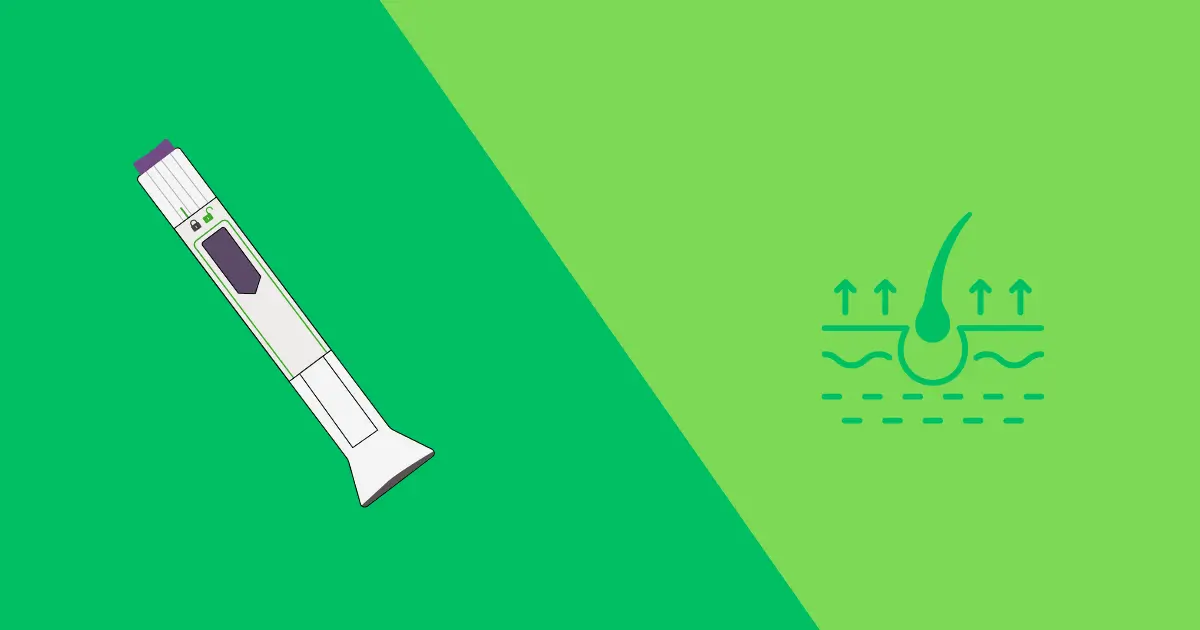Does tirzepatide cause hair loss? Understanding and managing hair thinning
If you’ve noticed more hair in your brush since starting tirzepatide, you’re not alone. Keep reading to understand the association between tirzepatide and hair loss, and what you can do about it.
Key highlights
- Hair loss is not listed as a side effect of Mounjaro, but it was seen in about 4% to 5% of people taking Zepbound (5 to 15 mg) during clinical trials.
- For some people, losing weight quickly (rapid weight loss) can stress the body and cause temporary hair loss, which is called telogen effluvium. Hair loss with tirzepatide may also happen due to changes in hormones or not getting enough nutrients.
- To help prevent or treat hair loss while taking tirzepatide, eat a healthy, balanced diet, increase your protein intake, try to reduce stress, and talk to your doctor about possibly lowering your dose or checking for other health issues.
- Check in regularly with your healthcare provider while taking tirzepatide. They can watch for early signs of hair loss and may run tests to see if a health issue or nutrient deficiency is causing it.
Obesity is a common health problem that affects millions of people around the world. Two popular ways to lose weight are taking weight loss medications like semaglutide (Ozempic or Wegovy) or tirzepatide, and having bariatric surgery. Both can help with significant weight loss, but they may also cause hair loss as a potential side effect.
Tirzepatide (Mounjaro and Zepbound) is an FDA-approved dual-action GLP-1/GIP receptor agonist from Eli Lilly used to treat type 2 diabetes and chronic weight management in combination with a low-calorie diet and exercise.
Hair loss isn’t a common side effect, but some people have noticed it while taking tirzepatide, especially Zepbound. In clinical trials, about 4% to 5% of people on Zepbound had hair loss, compared to 1% of people taking a placebo.
If you notice thinning or shedding hair while taking tirzepatide, it’s most likely due to the stress of losing weight quickly. The good news is that this kind of hair loss is usually temporary and gets better over time.
Concerned about hair loss on tirzepatide (Mounjaro, Zepbound)? Discover why this temporary side effect often occurs with rapid weight loss and learn practical strategies to manage shedding and promote healthy hair regrowth.
Is tirzepatide a direct cause of hair loss?
Yes, tirzepatide can cause hair loss, but it doesn’t happen to most people. It usually happens because of fast weight loss, not the medicine itself, and when that’s the reason, the hair loss is usually temporary.
The leading theory is that it’s an indirect effect, often triggered by the rapid weight loss that tirzepatide helps create. This kind of hair loss is known as telogen effluvium, a temporary hair shedding condition where hair sheds more than usual. It happens when the body goes through physical or emotional stress like rapid weight loss, which pushes more hair into the resting phase (wherein the hair follicles stop actively producing new hair strands and remain dormant), but the good news is, it’s usually temporary.
Out of the two brand-name versions of tirzepatide, only the prescribing information of Zepbound lists hair loss as a possible side effect. In studies with thousands of adults, 4% to 5% of people taking Zepbound (5 to 15 mg) reported hair loss, compared to 1% of people taking a placebo. For comparison, nausea was reported by 25% to 29% of people, diarrhea by 19% to 23%, and vomiting by 8% to 13%.
Nausea, diarrhea, and vomiting are common side effects listed for both Zepbound and Mounjaro. However, hair loss is not mentioned in Mounjaro’s prescribing information. That doesn’t mean it can’t happen, since both drugs have the same ingredient, tirzepatide. A 2022 study found that about 5% to 6% of people taking tirzepatide (5 to 15 mg) had hair loss or thinning.
Why might tirzepatide lead to hair loss?
Experts aren’t exactly sure how tirzepatide might cause hair loss. They believe the main reason is rapid weight loss, which is a key effect of the drug. Other factors that can play a role include health problems, hormonal changes, poor nutrition, and physical or emotional stress on the body.
Let’s take a closer look at what might be causing hair loss for some people taking tirzepatide.
Rapid weight loss
One of the main reasons people lose hair during health changes like fast weight loss is a condition called telogen effluvium (TE). It’s a temporary type of hair loss (alopecia) that happens when stress, hormone changes, or certain medicines cause more hair to enter the shedding phase. This usually shows up as hair thinning on the top of the head, starting about three months after the trigger.
People taking tirzepatide often lose a lot of weight, though the exact amount depends on the dose. In clinical trials, those using Zepbound lost between 15% and 20.9% of their body weight over about a year and a half. Research shows that higher doses usually lead to more weight loss.
The good news is that telogen effluvium, whether caused by fast weight loss or something else, is usually temporary. Most people see their hair start to grow back within 3 to 6 months after the shedding begins.
Nutritional deficiencies
When you lose weight quickly or change your diet, both common with tirzepatide, you might not get enough nutrients your hair needs, like iron, zinc, and biotin. Tirzepatide can lower your appetite and slow digestion, which means you might eat less and miss out on these important nutrients.
Additionally, poor absorption due to GI side effects of tirzepatide might also play a small role.
If your body doesn’t get enough nutrients your hair needs, your hair might start to feel thinner, become weaker, or fall out more than usual.
Hormonal fluctuations
When you lose weight quickly, your body changes, and your hormone levels can shift.
Tirzepatide is a glucagon-like peptide-1 (GLP-1) receptor agonist that copies a natural gut hormone and helps your body release insulin after eating. Evidence suggests that some similar GLP-1 drugs, like liraglutide or exenatide, may also affect other hormones like testosterone, growth hormone, and luteinizing hormone, but more research is needed to fully understand this.
Since these hormones help control hair growth, changes in their levels might disturb your hair’s normal cycle and could be one reason some people lose hair while taking tirzepatide.
Psychological stress
Weight loss isn’t just about your body; it can affect your emotions, too. Starting a new routine, changing your lifestyle, or getting used to a new medicine like tirzepatide can all be stressful. And as you’ve learned, stress can lead to loss of hair follicles.
In one small study, about 32% of men with high stress also had hair loss, compared to just 7.5% of men with low stress. For women, 9% with high stress had hair loss, while only 3.7% with low stress did. This emotional stress can also cause telogen effluvium, which leads to more hair shedding.
Underlying conditions
Health conditions like insulin resistance and type 2 diabetes, which tirzepatide (Mounjaro) is approved to treat, can sometimes be linked to hair loss, such as androgenetic alopecia (a common type of hair thinning).
Type 2 diabetes can affect blood flow and how your body uses nutrients, which may reduce the oxygen and nutrients reaching your hair roots. Over time, this can lead to thinning hair or more shedding. If you’re losing hair while on tirzepatide, it might be due to changes in your body from diabetes, not just the medicine. Talk to your healthcare provider to help figure out what’s going on.
How common is tirzepatide hair loss?
In clinical trials, up to 6% of people taking 5 to 15 mg of Zepbound for up to 72 weeks reported hair loss. Hair loss isn’t listed as a side effect for Mounjaro, though both drugs have the same active ingredient.
Losing weight quickly can sometimes cause hair shedding. A review found that 57% of people who had weight loss surgery also experienced hair loss afterward. While this isn’t about tirzepatide specifically, it shows that rapid weight loss can lead to temporary hair thinning.
Strategies to manage hair loss on tirzepatide
If you’re taking tirzepatide and want to avoid hair thinning, or if you’ve already noticed some hair loss, the best thing you can do is help your body handle the changes that come with weight loss and treatment.
Here are some simple ways to prevent and manage hair health while on tirzepatide:
1. Prioritize a nutrient-rich diet
Make sure you’re eating enough of the important nutrients that help keep your hair strong and healthy, such as:
-
Protein: found in eggs, fish, and other lean foods
-
Iron: found in beans, lentils, spinach, and tofu
-
Biotin: found in almonds, walnuts, and sunflower seeds
-
Zinc: found in oysters, chicken, and chickpeas
-
Vitamin A: found in sweet potatoes and bell peppers
-
Vitamin C: found in cashews, bell peppers, and berries
-
Vitamin E: found in avocados and almonds
These nutrients help support hair growth and may reduce shedding. Getting all these nutrients can be tricky, especially since tirzepatide lowers your appetite.
Drinking enough water is important for your overall health, and that includes your scalp and hair. When you’re dehydrated, your hair can become dry, brittle, and more likely to fall out. Staying well-hydrated helps keep your scalp healthy and supports strong, growing hair.
If you’re not sure what to eat or are having trouble getting enough healthy foods, it’s a good idea to talk to a healthcare professional or a registered dietitian.
They can help you create a meal plan that supports both your hair and your health goals. If needed, your doctor may also suggest a blood test to check if you’re low in any important nutrients for hair growth.
2. Consider a lower dosage
You can’t always control how fast you lose weight on tirzepatide, but studies show that higher doses usually lead to faster weight loss. Since losing weight too quickly can cause temporary hair loss (TE), slowing it down might help protect your hair.
Don’t change your dose on your own. If hair loss is a big concern for you, talk to your doctor. They can adjust your dose if needed, so you still reach your health goals while possibly reducing the impact on your hair.
3. Supplements
If you’re thinking about taking supplements to help with hair loss, talk to your doctor first. They can check for any deficiencies and make sure supplements won’t interfere with your medications or cause imbalances.
Some supplements that may help, if your levels are low, include:
-
Multivitamin: covers basic nutrient needs
-
Biotin: may help if you’re deficient
-
Iron: often needed if a blood test shows you’re low
-
Zinc: supports hair growth
-
Vitamin D: important for overall health, including hair
-
Omega-3: helps keep hair and scalp healthy
Remember, supplements are not magic pills; they support your health but don’t replace a balanced diet. Eating well is still the most important step.
4. Gentle hair practices
If your hair loss is caused by telogen effluvium, the good news is it’s usually temporary. Your hair should start growing back within about six months, once your weight levels out and your body has had time to recover from stress.
In the meantime, take extra care of your hair, avoid tight hairstyles, cut back on heat styling, and skip harsh dyes.
Taking care of your hair gently can help reduce breakage and support healthy regrowth, especially during times of shedding:
-
Minimize heat styling: Try to use blow dryers, straighteners, and curling irons less often to avoid drying out or damaging your hair.
-
Avoid harsh chemical treatments: Limit hair coloring, perms, and relaxers, which can weaken hair and lead to more shedding.
-
Brush gently: Use a wide-tooth comb and be gentle, don’t tug or pull, especially when your hair is wet.
-
Wear looser hairstyles: Avoid tight ponytails, braids, or buns that pull on your hair and stress the roots.
-
Use quality hair products: Choose mild shampoos and conditioners that are gentle on your scalp and free of harsh chemicals.
These small changes can help protect your hair and support its healthy return.
5. Manage stress effectively
Stress can mess with your hair’s natural growth cycle and lead to more shedding. Some early research shows that blocking a stress hormone might help hair grow back, but more studies are needed to know if this works for people.
Finding ways to manage stress can help with hair loss while taking tirzepatide, and it’s also great for your overall health. Try lifestyle changes like taking daily walks, spending time with people you care about, or practicing yoga, deep breathing, and meditation.
Good, restful sleep helps your body heal and supports healthy hair growth. Regular exercise can lower stress and boost blood flow, which helps carry nutrients to your hair roots.
If you’re feeling stressed or overwhelmed, talk to friends, family, or a therapist. Emotional support can make a difference for both your mind and your hair.
6. Pace your weight loss
Losing weight too quickly can put extra stress on your body and increase the risk of side effects like hair loss. A slower, steady weight loss is usually easier on your system and more sustainable.
Talk to your healthcare provider about the right pace of weight loss for you. They can help you find a balance that supports your health without causing unwanted side effects.
Never change your tirzepatide dose on your own. Always speak with your doctor before making any adjustments.
7. Topical treatments
Over-the-counter treatment (Minoxidil) is applied directly to the scalp and can help stimulate hair growth and slow down excessive shedding.
For more stubborn or long-lasting hair loss, platelet-rich plasma (PRP) therapy is a more advanced option where your blood is used to promote hair growth.
If you’re considering these treatments, it’s best to talk to a dermatologist or hair specialist. They can help figure out the treatment plan right for you and guide you based on your specific needs.
When to seek medical advice
Most cases of telogen effluvium (stress-related hair loss) improve or resolve on their own. With time, as your body adjusts and stress levels improve, your hair usually starts to grow back without any special treatment.
It’s smart to have regular check-ups while you’re taking tirzepatide. Your doctor can watch for things like low nutrients, hormone changes, or other issues that might cause hair thinning. Catching these problems early means you can take steps to fix them before the hair loss gets worse.
While most hair loss from tirzepatide is temporary, it’s important to pay attention to signs that might need medical attention:
-
Hair loss continues for more than 6 months after your weight has stabilized.
-
Hair loss accompanied by other symptoms like fatigue or feeling too hot or cold (possible thyroid issues)
-
Hair is falling out in unusual patterns, patches, suddenly, or in very specific areas.
-
You think you might have a vitamin or mineral deficiency.
-
Hair loss is making you feel very anxious, stressed, or affecting your emotional well-being.
Reach out to your prescribing doctor, a dermatologist, or a trichologist (hair specialist). They can help figure out what’s going on and give you the right treatment or advice.
Is tirzepatide hair loss permanent?
No, hair loss from tirzepatide is usually not permanent. In most cases, it’s caused by telogen effluvium, a temporary condition linked to rapid weight loss, stress, or nutrient changes.
For most people, hair starts to grow back once their weight stabilizes and the body adjusts. The hair growth cycle gradually returns to normal.
Hair usually begins to regrow within 3 to 6 months after the shedding starts. Full regrowth may take several more months, depending on the person.
Medical intervention may be needed if hair loss continues for more than six months after your weight has stabilized, as this could signal an underlying issue beyond temporary shedding. You should also seek help if the hair loss appears in unusual patterns such as bald patches, sudden or extreme thinning in specific areas, or if it’s accompanied by other symptoms like fatigue, weakness, or sensitivity to cold or heat, which could point to thyroid problems or nutrient deficiencies.
Additionally, if you suspect you’re lacking important nutrients like iron, vitamin D, or zinc, your doctor may recommend blood tests to confirm and treat any deficiencies. Finally, if the hair loss is causing emotional distress or affecting your confidence and well-being, it’s important to talk to a healthcare professional.
A doctor, dermatologist, or trichologist can assess the situation, rule out other causes, and offer treatment options tailored to your needs.
Tirzepatide hair loss FAQs
How long does tirzepatide hair loss last?
Hair loss from tirzepatide is not common, but if it happens, it usually gets better as your body adjusts to the medicine. In most cases, the hair grows back within a few months.
Should I stop taking tirzepatide if I lose hair?
Don’t stop taking tirzepatide without talking to your doctor, even if you notice hair loss. Your doctor can help you find out the cause and suggest ways to manage it.
Are there better GLP-1 drugs for hair loss?
There isn’t strong proof that one GLP-1 drug is better than another for preventing hair loss. If hair loss happens, your doctor might try a different medicine to see if it works better for you.
Conclusion
Hair loss on tirzepatide can be worrying, but it’s usually temporary and treatable with the right care and support.
About 6% of people taking Zepbound have reported hair loss, but hair loss is not listed as a side effect on the Mounjaro drug label.
Temporary hair shedding, called telogen effluvium, can happen when you lose weight quickly, a common effect of tirzepatide, as your body adjusts to health changes.
While telogen effluvium is the main reason for hair loss on tirzepatide, other things like low nutrients, hormone changes, or health problems can also lead to thinning hair during treatment.
Eating a healthy, balanced diet with nutrients like iron, biotin, and protein, lowering your stress, and gentle hair care are simple ways to help prevent and treat hair loss while taking tirzepatide.
In most cases, hair starts to grow back once your body adjusts to the changes from tirzepatide. With time, care, and support from your healthcare provider, your hair can return to its normal, healthy state.






